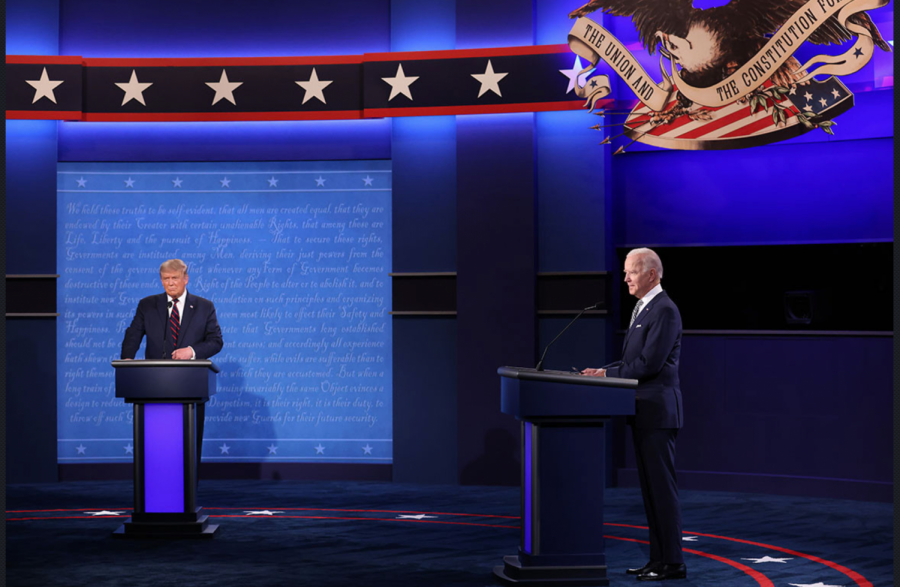The Impact of the First Presidential Debate
More stories from Shannon Kane
President Donald Trump and Democratic presidential nominee Joe Biden take the stage in the first presidential debate.
Joe Biden was elected the 46th president of the United States on November 7, 2020.
One question worth considering is whether some Biden voters might have been influenced by an event that occurred five weeks earlier: the first presidential debate of the election cycle. The debate was noteworthy because of its unprecedented lack of civility, which left many Americans questioning their belief in the political process.
The first debate of the 2020 election cycle was held in front of 107 guests at Case Western Reserve University in Cleveland and moderated by Chris Wallace of Fox News. The candidates were asked about six topics: the Supreme Court, COVID-19, the economy, race and violence in cities, their records, and the integrity of the election. Each topic was to last 15 minutes, with two minutes for each candidate to have individual speaking time and the rest for open discussion. The absence of opening statements was a notable difference from previous presidential debates, as was the choice to abstain from shaking hands for safety concerns.
Although the format of the debate was agreed upon by both parties, it was riddled with interruptions from both candidates. Dr. Coulombe, Pingree History teacher, was disappointed. “The whole point [of the debate] is for people to discuss policy,” he said. “I don’t think they actually had a single policy discussion.”
The first topic discussed was President Trump’s decision in the wake of Ruth Bader Ginsburg’s death to nominate Amy Coney Barrett to the Supreme Court – a controversial move given that less than two months remained in Trump’s presidency and congressional precedent would have suggested waiting until after the election. President Trump kept interrupting Biden during his allotted two-minute speaking time. This prompted Biden to eventually stop, mid-sentence, and say, “Will you shut up, man?” Chris Wallace had to ask President Trump to let Biden talk, to which Biden responded, “He doesn’t know how to do that.” The debate was filled with small retorts such as this. Despite near-constant bickering between the two candidates, they were each able to make several notable statements.
On the subject of the COVID-19, President Trump maintained his approach of blaming China for the coronavirus. “We don’t know how many people died in China,” Trump said. “They don’t exactly have accurate numbers.” He went on to target Biden, claiming, “He wants to shut down the country,” and therefore harm the economy. When asked why he continues to hold rallies, Trump replied, “People want to hear what I have to say… so far we have had no problem whatsoever.”
Biden’s focus was on President Trump’s poor response to the pandemic. He repeatedly appealed to the viewers’ emotions, especially fear of incompetence: “A lot of people died, and a lot more are going to if he doesn’t get smarter.” No clear plan for stopping the coronavirus was discussed by either candidate.
The night’s most anticipated topic, race and violence in cities, displayed the stark differences between the two candidates. Biden called for unity, asserting, “There’s nothing we cannot do if we do this together.” He spoke in support of racial sensitivity training and holding “bad apples” in the justice system accountable. In stark opposition to Biden, President Trump called for law and order. “You can’t even say the word law enforcement, because if you say those words, you’ll lose all of your radical-left followers,” Trump retorted. “They’ve got you wrapped around their finger, Joe.”
One of the most shocking parts of the evening came when moderator Chris Wallace asked President Trump whether he would condemn white supremacists. Trump deflected the question even as he seemed to “signal” support to the Proud Boys, a far-right, neo-fascist, and male-only organization that promotes and engages in political violence. “Proud boys, stand back, and stand by,” Trump said, adding, “ Somebody’s gotta do something about antifa.” Antifa is a loose network of antiracist, antifascist protesters that has gained visibility amid mass demonstrations for racial justice across the U.S. Dr. Coulombe found Trump’s statement about the Proud Boys statement to be very alarming. “I don’t think that [white supremacy is] something you can have the president of the United States fail to condemn. It has to be point number one, clearly expressed that there is no acceptance of white supremacy in the country. At all.” Julianna Aguja, a senior at Pingree, agrees. “He hasn’t shown that he has the capacity to actively dismantle white supremacy; therefore, he supports it.”
The last question of the night centered around the integrity of the election. Joe Biden used his time to urge viewers to create a voting plan. He also assured them that the results of the election will be legitimate. President Trump, on the other hand, claimed, “This is going to be fraud like you’ve never seen.”
The lack of actual policy discussion, replaced instead by incessant bickering on both sides, did little to help undecided voters. The second presidential debate was cancelled when President Trump declined to do a virtual debate despite his COVID-19 diagnosis. The third debate was a more measured affair. But it’s the first presidential debate of the 2020 election cycle – with its historic chaos and lack of civility, it will certainly remain a memorable one.
Now that the election results are in, one can only wonder whether Trump’s performance at the first debate nudged viewers in Biden’s direction.



Kathleen Sherman • Nov 24, 2020 at 7:16 am
The future of America is in good hands. Ms. Kane’s editorial was on point, clearly researched and well written! We will need people like her to lead our country in the decades ahead. Well done.